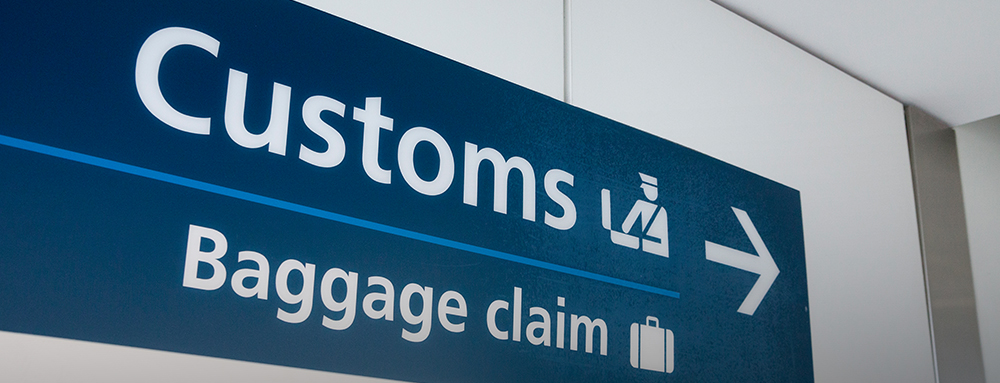On this page:
- What are biosecurity and border controls for?
- Documents you need to enter Australia
- Using Smartgates
- What can you bring into Australia?
What are biosecurity and border controls for?
The Australian government controls who and what can cross our border. This is to protect Australia's:
- environment
- economy
- health and wellbeing
- security.
Knowing the biosecurity and border controls helps you:
- avoid issues, penalties and fines
- reduce the risk of delays when you arrive in Australia.
Documents you need to enter Australia
To enter Australia, you need:
- a valid passport
- a completed Incoming Passenger Card (IPC)
You might need to answer questions from Border Force officials.
All Australian passports are ePassports. An ePassport holds electronic information that helps confirm your identity.
To find out if you have an ePassport, look for the symbol described in Figure 1.
![]()
Figure 1: Look for the circled symbol on your passport cover.
Using SmartGates
SmartGate is Australia’s automated passport control system. You can arrive and depart Australia through a SmartGate. SmartGates use your passport and facial recognition technology to check your identity and process you through Passport Control. It is quick and secure, meaning you can leave the airport faster.
You may be able to use arrivals SmartGate when you get to Australia if you:
- have a valid epassport
- filled out an IPC
- are aged seven years or older
- over 1.1 metre (3 feet 6 inches) tall
Arrival SmartGates are at international airports in:
- Adelaide
- Brisbane
- Cairns
- Darwin
- Gold Coast
- Melbourne
- Perth
- Sydney
Find out more about SmartGate.
What can you bring into Australia?
The Australian Border Force and Australian biosecurity controls:
- what you can and can't bring in
- whether you need a permit.
You must declare certain goods for customs and biosecurity inspection on your entry into Australia.
If you declare goods, go to an inspection gate on arrival. An officer will assess the items.
If you're unsure about bringing something into Australia:
- don't bring it with you to Australia or
- throw it in the bins at the airport terminal before the inspection gates.
You could be fined or prosecuted for carrying undeclared controlled goods.
Officers screen your luggage using:
- detector dogs
- x-ray machines and/or
- baggage inspection.
In many cases, they'll return your declared goods to you after inspection.
- Some items might need treatment to make them safe.
- Some items aren’t allowed into Australia because of the risk of pests and diseases. Officers may seize these for export or destruction.
Before travelling, check what you can bring back to Australia.
Biosecurity controls
Australia has strict biosecurity controls. These help reduce the risk of pests and diseases getting into the country. You must follow the rules when you enter Australia.
Do not bring any food, plant material or animal products into Australia. If you do bring these items, you must truthfully declare them on arrival. All footwear, clothing and equipment used in rural areas or near animals must be thoroughly cleaned and declared on arrival.
Check detailed import conditions for plants, animal and food products on the Biosecurity Import Conditions system (BICON) website.
Do not risk penalties, visa cancellation or criminal prosecution by breaching Australia’s biosecurity laws. Find out more about travelling to or sending goods to Australia.
Wildlife products
You must declare wildlife products on arrival in Australia. Some may also need a permit.
If you buy wildlife products overseas, find out if you need a permit before bringing them home with you. If you don't have the correct permit, authorities will seize your product. Penalties or fines may apply.
'Wildlife' includes anything that comes from a plant or animal. Examples include:
- protected wildlife, such as coral, orchids, caviar and hunting trophies
- wood and seeds
- ivory
- insects
- leather or fur
- traditional medicines using animal organs, teeth or body parts
- faeces
- live plants
- fresh or dried flowers.
Restricted and prohibited items
You must declare restricted or prohibited items arriving in Australia.
See the full list of restricted or prohibited goods from the Australian Border Force.
Medicines, drugs and herbal remedies
You need to declare all medicine, including:
- prescription medications
- alternative and herbal medicines
- vitamins and mineral preparation formulas
- performance- and image-enhancing drugs
- veterinary medicines.
Read more about bringing medicines into Australia.
Medical vapes
A ‘traveller's exemption’ applies if you're bringing medical vapes into Australia. It limits how many vapes, accessories and substances you can bring.
Read more about the rules for bringing vapes and vaping goods into Australia.
Cash
You must declare cash or non-cash forms of money (such as cheques or money orders) in Australian and foreign currency if the total value is AUD10,000 or more.
You must fill out the submission form on AUSTRAC’s website before arriving or departing Australia. Save a copy of your submission receipt as you might need to show it to an Australian Border Force or police officer.
See also external information
- Australian biosecurity advice on bringing items back to Australia.
- Australian Border Force guidance on returning to Australia through quarantine
- Department of Climate Change, Environment, Energy and Water's information for travellers returning to Australia
- Therapeutic Goods Administration website for information about bringing medicines and medical products into Australia.
- Australian Pesticides and Veterinary Medicines Authority website for information on regulations of the veterinary pharmaceuticals you can and can't bring into Australia.

